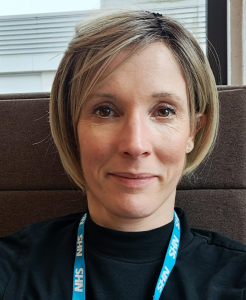SEND – Special Educational Needs and Disabilities

Roz Wall is the Designated Clinical Officer for Special Educational Needs (SEND). Roz is a paediatric occupational therapist with 20 years’ experience working in areas such as the acute setting at Manchester Children’s Hospital, Inscape House School and community paediatrics in the Manchester Local Care Organisation.
Contact Roz on r.wall6@nhs.net, 07825 864 783. Her working days are Monday, Tuesday and Wednesday, 8am – 5pm, term time only.
Stockport GP SEND Handbook – Supporting Children and Young People aged 0-25yrs with SEND
The Stockport GP SEND handbook for 2024, is available via this link
Role of the GP in contributing to the EHCP
The regulations which support the Children and Families Act 2014 places a duty on local authorities to obtain medical advice and information from a health care professional identified by the responsible commissioning body when carrying out an EHC assessment.*
Also, as part of the EHC assessment process, NHS bodies have a legal responsibility to respond to requests for advice and information within 6 weeks from the date on which they received the request.*
GPs may need to provide this health advice especially if the CYP may not have seen a specialist for many years. For example, a 16-year-old young person diagnosed with Autism when they were 6 years old and not seen a specialist ever since. It vital that when advice is sought you only comment on health issues and DO NOT recommend ANY educational provision for example special needs school or 1:1 teaching.
This is NOT the remit of health care professionals and there are other professionals who will be providing this advice for example education psychologist. Remember, you could potentially be called to a SEND tribunal and will have to justify any advice or recommendations you provide.
If you are unsure, please speak to the DCO/DMO. The Council for Disabled Children has useful information on providing health advice. Please see reference below for the link. *Reference: “Council for Disabled Children – Requirements to provide Health Advice within six weeks”.
Looking After the Health of Patients with Learning Disability (LD) and Highlights from the Learning Disability Death Review (LeDeR) report.
Please have a look at the following link for the latest LeDeR report (2021). Learning from Lives and Deaths – people with learning disability and autistic people (LeDeR) (kcl.ac.uk)
NHS England » Learning from lives and deaths – People with a learning disability and autistic people (LeDeR) policy 2021 The points to highlight from the latest report is showing people with LD die 22 years younger than the general population. People with LD are more than twice as likely die before their time.
The most important interventions, which are useful to the care of the learning disabled:
1. Annual Health Checks
2. LD liaison nurse
3. Reasonable adjustments such as A. More time, B. Calm Place, C. Easy to understand information. Please consult the following link to know more about reasonable adjustments and how to implement. NHS England » Reasonable adjustments
The information from this guide can be found in the following sources:
- Council for Disabled Children – Focus on Health Advice learning modules Level 1, 2, and 3. Focus on Health Advice | Council for Disabled Children
- SEND e-learning Stockport Council SEND e-learning | Stockport Information and Childcare Directory (fsd.org.uk) As part of our SEND improvement journey we have created a SEND e-Learning course which is aimed at everyone who works with children and young people aged 0-25. It can be completed by anybody who has an interest in developing their knowledge and understanding of special educational needs and disabilities – SEND. Introduction to Special Educational Need and Disability (SEND)
- SEND Code of Practice: 0 to 25 years – Statutory guidance for organisations which work with and support children and young people who have special educational needs or disabilities – SEND code of practice: 0 to 25 years – GOV.UK (www.gov.uk)
- SEND review: right support, right place, right time – SEND review: right support, right place, right time – GOV.UK (www.gov.uk)
- Supporting pupils with medical conditions at school. Supporting pupils with medical conditions at school – GOV.UK (www.gov.uk)
Creating a Sensory Friendly Surgery
The children, young people and adults you see in your surgery may struggle with sensory processing difficulties. Here is an easy read guide on how to recognise and understand sensory processing difficulties and how to create a sensory friendly environment in your GP surgery.
Sensory friendly resource pack
Understanding sensory processing
What is the role of Practices in supporting SEND and Learning Disabilities?
Practices play a vital role in supporting individuals and their families with SEND and Learning Disabilities. The information below provides a useful guide for GPs and Practices on how to support children, young people and adults with SEND and Learning Disabilities.
Co-production of SEND Services
Listening and co-producing services with children and young people that have special educational needs and disabilities, and their families, is an essential part of the work we do.
By sharing decisions and understanding how services can be improved means that local services are shaped directly by those who use them, through their lived experience.
Over the last few months the CCG, NHS Trust and Council have worked in partnership with families and young people to find out what matters most to them. The video below illustrates what matters to young people.
What is the Local Offer?
The Local Offer gives children and young people with Special Educational Needs and Disabilities (SEND) and their parents or carers information about what activities and support are available in the area where they live.
The Local Offer aims to improve choice, flexibility and transparency for families and to help them have more control over services by setting out the local provision for children and young people with SEND and their families.
For more information on the Local Offer visit: Stockport Local Offer
What services are commissioned for children and young people with SEND?
In addition to the general services that are commissioned for the whole of the population, health services specifically provided for children and young people with additional needs include:
- Therapy services – Speech and Language Therapy, Physiotherapy, Occupational Therapy
- Child and Adolescent Mental Health Services
- Continuing and complex care assessments and packages
- Equipment including wheelchairs and mobility aids
SEND Inspections
Local SEND services are inspected jointly by Ofsted and the Care Quality Commission. To read the latest information on the Stockport SEND Inspection visit: Stockport SEND Inspection
